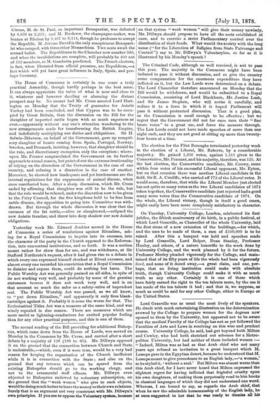The House of Commons is certainly in one sense a
truly practical Assembly, though hardly perhaps in the best sense. It can always appreciate the value of what is near and close to it, whatever and however dazzling or alarming the distant prospect may be. No sooner had Mr. Cross assured Lord Hart. ington on Monday that the Treaty of guarantee for Asiatic Turkey had been concluded, and that Cyprus was to be occu- pied by Great Britain, than the discussion on the Bill for the slaughter of imported cattle began with as much eagerness as ever,—apparently without any one's attention wandering to the new arrangements made for transforming the British Empire, and indefinitely multiplying our duties and obligations. Sir H. Selwin-Ibbetson, on behalf of the Government, gave up compul- sory slaughter of beasts coming from Spain, Portugal, Norway, Sweden, and Denmark, insisting, however, that slaughter should be the rule, and discretionary exemption only the exception ; where- upon Mr. Forster congratulated the Government on its further approach to sound reason, but pointed out the extreme irrationality of relying on the discretion of the Government in the case of one country, and refusing it a discretion in the case of another. Moreover, he showed how inadequate and yet burdensome are the internal regulations for the suppression of animal disease, when once manifested here. After a sharp discussion, which Mr. Cross ended by affirming that slaughter was still to be the rule, but that the rule would be relaxed, under the discretion now to be given to the Privy Council, for the five kingdoms held to be free from cattle disease, the opposition to going into Committee was with- drawn. But through the whole discussion it was clear that the carcases of the fat cattle,—alive or slaughtered,—eclipsed the new Asiatic frontier, and threw into deep shadow our new Asiatic obligations.


































 Previous page
Previous page